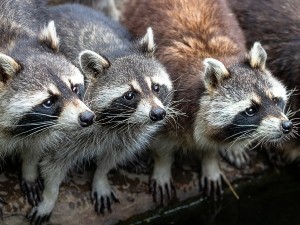
Eating from the trash will get a human sick but not a raccoon, so how do raccoons not get sick?
Raccoons do not get sick because the bacteria and pathogens that they ingest from garbage food gets killed in their very acidic stomachs. Another reason why they do not get sick is that the carcass eating bacteria that raccoons ingest isn’t toxic and is also non-pathogenic so it won’t make them sick.
Raccoons are known to rummage through trash to get their food. As we know, the garbage isn’t the cleanest or safest place to get your food. If humans were to do this we would get sick on a regular basis but raccoons seem immune to the bacteria in garbage. So how to raccoons not get sick? This article looks into it, so whether you’re a concerned raccoon lover wildlife enthusiast or are simply curious this article is for you
Table of Contents
How do raccoons not get sick?
Raccoons don’t get sick because they’ve evolved not to. These animals are scavenging animals, scavenging animals seldom get food poisoning from the food they eat. The carcass eating bacteria that raccoons ingest isn’t toxic and in addition, it’s non-pathogenic so it won’t make them sick.
When it comes to the type of bacteria that does cause illness, this bacteria gets killed in the stomach. A raccoons stomach acid is very acidic, these animals will only get sick if the illness-causing bacteria is present in large numbers. This is also the case for other scavenging animals such as vultures, scavenging animals get sick only occasionally.
In addition, the length of their intestines also makes a difference. These animals have a long intestinal tract so the intestines have time to rid itself of toxins as the food passes
Also, scavengers in general, including raccoons, have evolved over time to be able to resist toxins and microbes that may be in food. For example, animals can often be seen eating the faeces of another animal but won’t get sick.
What illnesses can raccoons get?
Leptospirosis: This is a disease that raccoons can get through contaminated feed and water by urine. This bacterial disease can cause the animal to become severely ill and die
Canine distemper: This is a very common viral infection and one of the most common causes of histopathologic lesions in raccoons. Neurologically, it causes raccoons to have similar signs to rabies
Parvoviral enteritis: Signs of this disease include bloody diarrhoea, a loss of appetite, a loss of the fear of humans and lethargy in raccoons. Contact with this disease happens when the animal eats a pig carcass that contains this virus
Intestinal roundworm: Intestinal roundworms can infect the raccoon if the animal eats roundworm eggs. These eggs can survive outside the body for several years making the chances of infection very high. They hatch in the raccoon’s body causing severe disease symptoms such as a loss of muscle control, tiredness, lack of coordination, blindness and comma
Rabies: Raccoons, according to the general public, are seen as one of the primary carriers of rabies. The symptoms of rabies in raccoons include frothing from the mouth, paralysis, drooling, being active during the day, aggression and a loss of fear of humans
What to do with a sick raccoon?
If you find a sick raccoon you should not take it home or touch it, there is always a chance that it can bite you and get you sick. If the animal is sick, there is little that will help it survive the infection, the disease can take several weeks to run its course.
The best thing you can do is to call animal services. Animal services will ensure that the animal is humanely taken care of, they will also ensure that the animal won’t suffer during its last days. Do you not leave food out for the animal because this can attract other wildlife.
Summary
In summary, raccoons do not get sick because the bacteria and pathogens that they ingest get killed in their very acidic stomachs. Any bacteria that is left will be removed in the animals long intestine‘s.
Raccoons still can develop illnesses from other types of bacteria and these illnesses include leptospirosis, canine distemper, parvoviral enteritis, intestinal roundworm and rabies to name a few.
If you find a sick raccoon do not touch it and do not feed it, call wildlife services and they will take care of it in its last days
If you enjoyed this article then you may also be interested in other raccoon related articles. Here are some articles that you may be interested in: why are raccoons hunted, why do raccoons eat garbage, how to keep raccoons from eating tomatoes, why are raccoons fat

